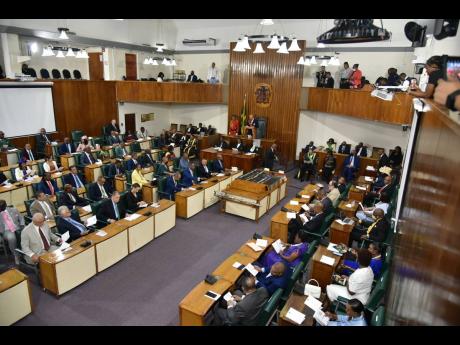Rosalea Hamilton | Achieving accountability to people of Jamaica
June 15 marked one month since the unconscionable announcement by Finance Minister Nigel Clarke to increase the salaries of the political directorate by more than 200 per cent and to increase the tax-free salary of the governor general (GG) by 183 per cent.
It is now way beyond a “nine-day wonder”. Street protests, online advocacy, popular music, videos, letters, articles, petitions, talk shows, and other means have persisted as Jamaicans, at home and abroad, continue to voice their outrage. The fact that the announcement was made on the heels of public-sector protests and protracted negotiations with the trade unions, who were told to accept the wage offer as their demands for more pay would “reverse the economic gains made,” has been troubling.
At the close of the 2023-24 Budget Debate on March 21, the JIS reported that Minister Clarke “advised that 95 per cent of public officers have indicated acceptance of the offer, which sees them getting a 20 per cent salary increase over three years, from 2022-23 to 2024-25”. Church leaders and other others have described the increases as “ungracious and inequitable” and have highlighted the immorality of the decision, which widens “income disparities between the governed and the governing.” Others, including the Advocates Network, have also highlighted the absence of accountability arrangements to determine whether these increases are warranted.
Describing the more than 200 per cent increase as a “shocking amount” that could have been higher if the Cabinet hadn’t chosen to “bring it down,” Prime Minister (PM) Holness has emphasised the importance of accountability. In fact, he expressed his pleasure with the public call for accountability and performance standards and noted that the measures have been established. Speaking at a house handover ceremony in St Catherine on May 19, 2023, he said: “We have established, and I will announce shortly, a series of accountability measures, and I have said to my MPs and the ministers that the cost of this policy is accountability.”
On June 6, the PM announced plans to establish a parliamentary committee to review job descriptions and a code of conduct for ministers, parliamentarians, and MPs. These are two of the “Accountability Measures for MPs and Cabinet Ministers” listed by Information Minister Morgan on Twitter (May 22):
1. Written job description to be tabled in Parliament.
2. Code of ethics has been enhanced for MPs and Ministers - will be reviewed at the next Cabinet.
3. Financial penalties for unexplained absences from sittings of Parliament and Committee Meetings.
4. Written accountability reports by MPs - report to be removed by committees.
5. Special courses of training for MPs and Senators - to be certified - first course will be parliamentary procedures, practices, and standing order.
6. Ministers will be publishing targets and policy goals. To be tabled as Ministry Paper.
OBFUSCATES CORE ISSUES
This list obfuscates the core issues of accountability. In our democracy, MPs are accountable to the people, mainly through elections. This requires active oversight and scrutiny of the work of MPs by the people as part of civic responsibility in a democracy. This people activism is important to initiate recall or impeachment proceedings for MPs. A Parliamentary Code of Conduct/Ethics provides an additional mechanism through which individual MPs can be held accountable by fellow parliamentarians. Codes of conduct, such as those guided by the “Nolan Principles” (seven principles of public life), reinforce moral virtues, including “selflessness”, to encourage MPs to “act solely in terms of the public interest”.
Importantly, our Constitution provides for Cabinet accountability to Parliament. However, Parliament is not currently designed to achieve effective accountability. Instead, the PM and the Cabinet dominate Parliament and perpetuate unfettered “constitutional” or “elective” dictatorship, thus denying any prospect of effective accountability, whatever the accountability measures put in place. Accountability to Parliament will require effective legislative oversight and scrutiny of executive actions.
REQUIRED LEGISLATIVE OVERSIGHT
According to Section.69(2) of the Jamaican Constitution, “The Cabinet shall be the principal instrument of policy and shall be charged with the general direction and control of the Government of Jamaica and shall be collectively responsible to Parliament.” This provision empowers the PM and Cabinet minister to undertake the executive function of Parliament. The missing element is the structure that ensures “collective responsibility to Parliament,” including accountability by the PM. In the absence of this structure, the PM and Cabinet ministers have long acted without independent scrutiny and effective oversight by the non-executive members of the Legislature. What is required is a structure that gives real meaning to the constitutional mandate that the Cabinet “shall be collectively responsible to Parliament”. It is this structure that would prevent the salary debacle that Jamaicans are confronting today. As things stand now, the executive decision on salaries for the political directorate and the governor general dominates and is essentially unchallenged by MPs, even with the loud protests, popular songs, strong social media posts, and other forms of advocacy by the Jamaican people.
In a truly representative democracy, the main job of MPs is to represent the people when making law. In doing so, they must carefully scrutinise all policies and related legislation and undertake monitoring and evaluation to ensure that the Executive complies with and implements the law. This legislative oversight of the executive mainly takes place through Parliamentary Oversight Committees. With appropriate committees in place, this matter of the salary increases would be addressed as part of the legislative responsibility of the Parliament prior to the minister’s announcement. Moreover, in the process, the appropriate committee would hold mandatory public hearings so that the legislators could benefit from the diverse perspectives of the public when making their decisions. Accountability to the Jamaican people would mean that important parliamentary decisions, such as salary increases for politicians and the GG, would be made AFTER consultation with the public through hearings, public consultations, dialogue with constituents, and other information-collection mechanisms.
EXECUTIVE SHOULD BE SMALLER
So, what Parliamentary design would deliver that kind of accountability? One basic requirement is that the Executive should be much smaller in number than the non-Executive members of the Legislature – indeed a tiny minority in the House. This would also effectively constrain the power of the prime minister in assigning ministerial/Executive powers to as many MPs or senators as he/she wants. Importantly, the non-Executive legislators of the winning party should also significantly outnumber the Executive. Another requirement is a restructured Senate with elected, rather than appointed, senators who can strengthen people’s representation and enhance accountability.
As Jamaicans engage in constitutional discussions to establish a republic, such a redesign of Parliament must be embedded in the Constitution to avoid a repeat of this salary debacle and to ensure accountability to the people of Jamaica.
- Rosalea Hamilton, PhD, is founding director, Institute of Law & Economics. Send feedback to rosaleahamilton@gmail.com


